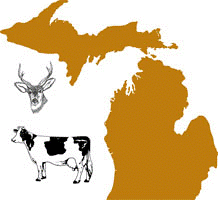Wildlife Disease and Zoonotics
Date of this Version
2009
Abstract
Tuberculosis continues to be an important disease both in humans and animals. It causes morbidity, mortality, and economic loss worldwide. The occurrence of Mycobacterium bovis disease in humans, domesticated and wild animals confirms the relevance of this zoonosis. M. bovis in humans continues to be reported in industrialized countries and in immigrants from regions of the world where tuberculosis in cattle is endemic. The real incidence of M. bovis in humans in developing countries continues to be roughly underestimated due to the scarcity of appropriate laboratory facilities to isolate and to differentiate M. bovis strains. In Latin America, less than 1% of tuberculosis cases are reported as being due to M. bovis. However, the economic relevance that meat and dairy industries play in these countries stimulates the promotion of bovine tuberculosis eradication programs. Human-to-human airbourne transmission of M. bovis does occur and it may be important where human immunodeficiency virus (HIV) infection in cattle is enzootic and pasteurization of dairy products is not routinely practiced. Eradication of M. bovis in cattle and pasteurization of dairy products are the cornerstones of prevention of human disease.



Comments
Published in Veternaria Italiana, 45 (1), 135-181.